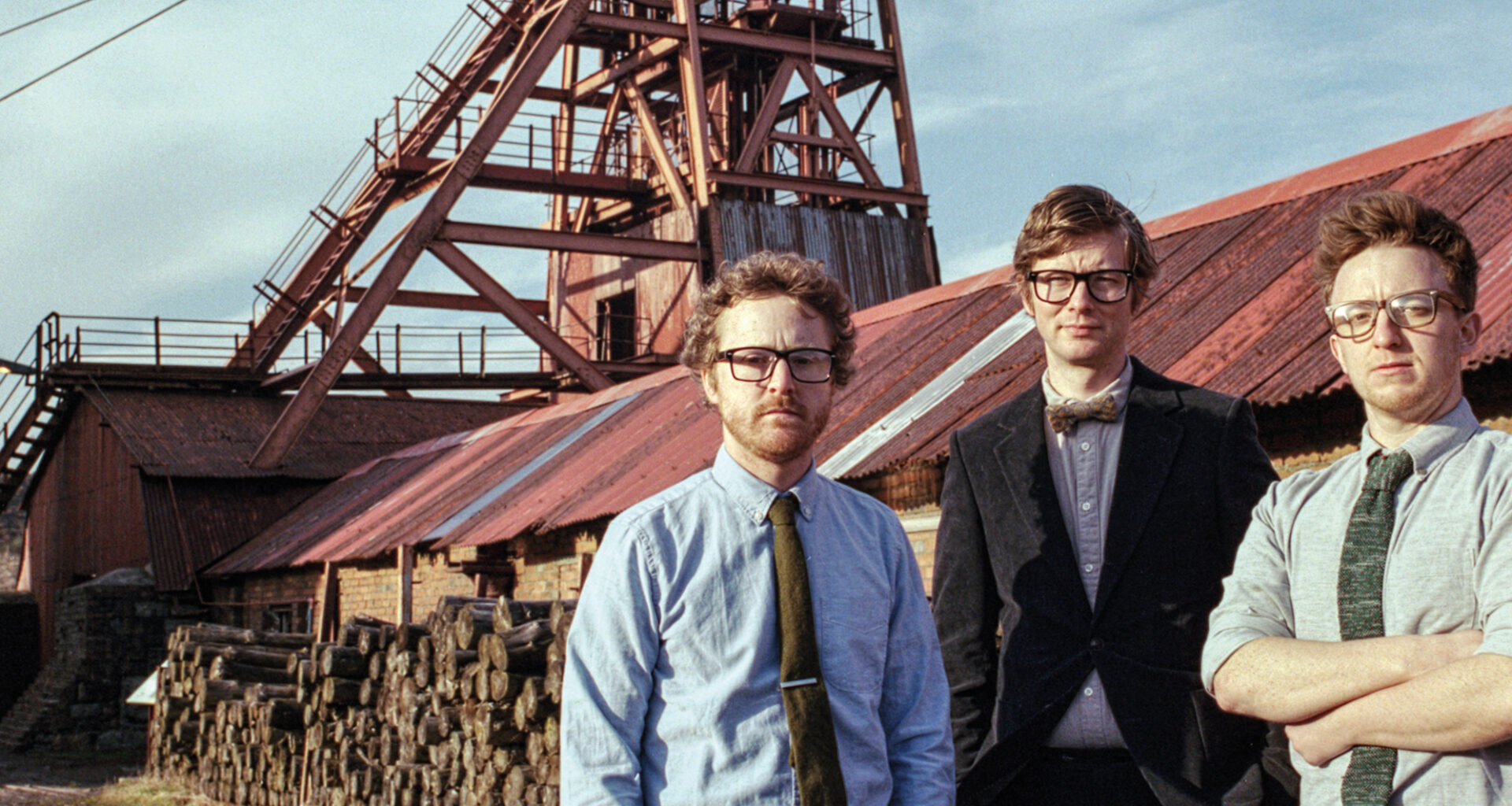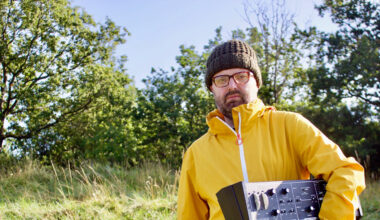Recorded in one of the communities where it happened, Public Service Broadcasting’s absorbing ‘Every Valley’ album tells of the rise and fall of the Welsh mining industry through the eyes of those it affected most deeply
“I think if you said to most people, ‘Hey, do you want to come round and listen to an album entirely about the industrial decline of coal mining in South Wales?’. I’m not sure how many of them would turn up,” laughs J Willgoose Esq, one third of Public Service Broadcasting who, with his similarly evasively-named partners Wrigglesworth and JF Abraham, tackle that very topic on their latest LP, ‘Every Valley’.
The mining history of South Wales is often described as among the worst examples of colonialism founded on the hunger for natural resources. Forget oil and diamonds in Africa, or the gold rush on America’s wildest frontiers, this happened right here on our doorstep. First it was the conquering Romans, who used coal liberally to heat their homes, baths and fortresses. Then by the unstoppable force that was the Industrial Revolution, which provided the technology to dig deep below the ground and extract more of the fuel that powered the engine room of Victorian progress.
Wales provided the manpower, with whole communities developing around the pits, but all of that changed in the 1970s and 1980s when mining became a divisive political issue in the hands of the Thatcher-led Conservative government. Growing National Union Of Mineworkers action, the relatively high price of domestic coal production versus foreign imports and the first flushes of a push toward cleaner energy, all conspired against the Welsh miners. The industry was eventually foisted into the private sector, mines were slowly shuttered and whole communities were left suffering the kind of deprevation that seemed inconceivable for a part of Britain that had been the engine room of a rapid economic ascendancy.
Given that Public Service Broadcasting’s last album, 2015’s ‘The Race For Space’, concerned itself with astral matters and various moonshots of scientific progress, ‘Every Valley’ is a more parochial affair.
“There was a danger that we were only ever going to cover great epics, and fall into the same old traps,” says Willgoose of the motivation behind the new record. “We wanted to do something a bit riskier. Quite where the geographical element of focussing it more tightly on South Wales came from I can’t say, but I do remember thinking that it would be a nice juxtaposition with the album before. You can be doing something as vast as space and then come right back down and focus on something that’s about a region in the UK that went from such boom to almost complete bust.”
It would be reasonable to think that maybe there is some significant Welsh ancestry or connection to the industry that provided the impetus for ‘Every Valley’, but there is none. Which is perhaps one of the reasons creating the album felt like a risk to Willgoose and co, that maybe the people they wanted to involve in the project would be cynical of its authenticity and wary of engaging with them because of their lack of direct connection.
“There’s a risk of addressing something like this that still has all kinds of baggage attached to it, and whether or not it was within our purview as south Londoners to be writing about it,” he says. “It does feel like you’re opening yourself up on multiple fronts to people shouting at you and telling you you’re the worthless creator of things that you know nothing about… but I do think that’s a good position to put yourself in, you’re challenging yourself and trying things you haven’t tried before, and that’s what being an artist should be about.”
Despite his concerns, ‘Every Valley’ has an objectivity and sensitivity that is a familiar dimension to Public Service Broadcasting’s music. By carefully placing samples from the BFI film archive throughout their thought-provoking and varied musical backdrops, they create an environment where it is up to the listener to form their own personal conclusions on whatever the subject matter happens to be. The title of their first album, ‘Inform-Educate-Entertain’, set out their intentions from the start, and as such they are able to present such a weighty political topic without necessarily coming across as political. That said, Willgoose admits to being nervous during the process of engaging with those who had been affected by the closure of the mines and the strikes.
“There’s still an active National Union Of Mineworkers in the South Wales area, so I felt like a massive impostor going in to meet them, to talk to them about the strike and their experiences,” says Willgoose. “I thought they’d have all the suspicions you’d have of someone who’s never done a day’s hard graft in their life. I was genuinely amazed that it didn’t seem to be an issue, or if it was, they were very good at hiding it.”
Willgoose admits that he went through the same anguished feeling after releasing ‘The Race For Space’, where he expected those closer to the topic to pour scorn on the album, but it was so well received that one former astronaut even bought a copy. “Maybe I just need to stop worrying so much and have a bit of faith,” he sighs.
Preparing for ‘Every Valley’ the band undertook interviews with local residents in the Ebbw Vale area, where they also recorded the album, both to get context for the project and to source first-hand samples instead of trawling through the BFI archives. That only one snippet of conversation made it to the album – a recording of one former miner on ‘Mother Of The Village’ talking about his belief that conditions for the miners would return to normal, even though they never would – is secondary to Willgoose.
“It was useful to sit in the same room as people who were directly involved and to hear their own testimonies and not have them passed through any other filter than the conversation you’re having with them,” he says.

Spending a month recording the album in Ebbw Vale also helped the trio immerse themselves in the overall process more than with any of their previous projects.
“We were there long enough for the area to make a dent on us,” says Willgoose. “The previous two records were pretty much made on a shoestring, whereas this had a budget that was sufficient to allow us to be in the studio for more than three days, which was the length of the sessions for the past two albums.
“Even the process of transforming the room we were using into a studio was quite DIY. It felt like a good mirror for what we were trying to talk about on this record, we were not just turning up to some plush studio in Wales and saying, ‘Right, we’re going to make an album about Wales now, here we are, now where’s my cocktail?’.”
At least a studio is somewhat cleaner than the dirty conditions of a mine.
“Well, you haven’t hung around Wrigglesworth too often,” laughs Willgoose.
As an album, ‘Every Valley’ closely follows the trajectory of mining in Wales. The opening section, where the subject matter is of rapid progress and a sense of pride in what was seen as an limitless endeavour with multiple centuries of coal left to exploit, is paired with tracks broadly affixed to an electronic palette; the album then pivots on the aggressive, angry almost, Sonic Youth-esque rock of ‘All Out’, signifying the 1984/85 miners’ strike; the album then becomes both more defiant on a track with Manic Street Preachers frontman James Dean Bradfield (’Turn No More’), and then more maudlin and sparse. Willgoose says that this wasn’t planned, but the idea of making the record sound more stark toward the end to reflect the post-strike environment of South Wales was an obvious angle.
The track with Bradfield signifies a slight change of direction for Public Service Broadcasting, being one of a handful of collaborations alongside the BFI samples. “We worked with a choir and Smoke Fairies before on ‘The Race For Space’, but that was more about getting them to sing things for us to sample and play with.”
As well as the Manic’s frontman, the record also features contributions from The Beaufort Male Choir, Derbyshire post-rock trio Haiku Salut, 9Bach’s Lisa Jên Brown and Tracyanne Campbell of Camera Obscura. Willgoose says that there was a practical element to using lyrics and actual song structures this time around.
“There’s a line that Tracyanne Campbell sings on ‘Progress’, ‘I believe in progress’,” he explains. “I knew that I wanted that line to be central in that song, but for all the will in the world I don’t think you’re going to find a piece of archive footage with someone saying those exact same words in a way that says as much as getting her to just go ahead and sing that.
“Once you’ve crossed that barrier in your head you start to wonder if there are other things where we can take a bit more of an active hand in shaping things. I don’t want to ever set silly, arbitrary rules for ourselves, but it’s always worth questioning yourself. Part of our constant self-interrogation is what made the album what it is.”
While we have you, why not take a minute to browse our online shop?
We’ve got print magazines, limited edition vinyl, must-have books, CD boxsets, and we ship worldwide. Click below to open a new tab and keep your current reading place.
Willgoose readily admits that his initial attraction to BFI samples at the start of Public Service Broadcasting was intentionally more throwaway, peppering their earliest tracks with gestures that tied them to a sampling tradition that was about throwing anything and everything at a track.
“It was about using the audio primarily for its character and its sound, rather than for any of its content,” he recalls.
The thematic possibilities of using those samples to educate and inform hadn’t presented themselves at that point, but they began to see how using those archive inputs gave a relatively borderless quality to Public Service Broadcasting’s music.
“When we came out with the first album in 2013, people couldn’t see where we could go after that,” says Willgoose. “It was so frustrating, I knew we were going to do ‘The Race For Space’ next, and I knew what kind of album I wanted to make.
“I really don’t think it’s necessarily the job of the person writing about the music to ask where an artist might go next. That’s why creative people create things, because they have the imagination and drive. You don’t need other people worrying about your concept for you. I’m the one who’s got to worry about it.”
Unlike Test Dept, who literally fought on the picket lines shoulder-to-shoulder with the miners during the strike, Willgoose was otherwise engaged at that time. “I was two years old, so I don’t think it was particularly high on my list of things to be aware of,” he says. However, as he grew up he began to appreciate the importance of what had happened within his lifetime.
“I think it’s one of those things that becomes more apparent with age and with hindsight,” he says. “Looking back at the impact it’s had, this was probably the largest industrial conflict of the last 50 years, and it’s had a bearing on everything that’s come after it, including the current political climate.”
Arriving at a point where The Labour Party have achieved significant Welsh wins in the recent UK election, and where public dissatisfaction with the status quo and inequality imbalances is leading to populist response, it’s easy to trace a line back to the sour taste left by the abrupt privatisation and closure of the mines, along with the heavy-handed response to dismantling the strike.
Even though Willgoose has immersed himself fully in these issues, he still feels like they have only just scratched the surface with this record.
“One of the things I was worried about when it came to doing interviews for this album was that people might start talking about very specific things to do with the strike,” he says, “but it’s really not what ‘Every Valley’ is about at all. This is an album about human progress and the people in communities who get swept aside by it. What happened in Wales is just the most extreme example of it.”
Hemmed in by the troubling questions of political responsibility and the often opposing forces of public subsidies, economics, global trade, sustainable energy production, ‘Every Valley’ represents a thought-provoking record on a topic in British history that has had far-reaching ramifications.
“I think part of the motivation for this album was to try and highlight the debt that we owe these people,” says Willgoose. “It’s motivated from a very similar place to an article that George Orwell wrote about coal mining. The people doing these jobs and making our lives comfortable, and we owe them a great deal. That’s what comes out of it for me.
“I can’t speak with any great authority on, well, anything in life, but I am certain that the mine closures could have been done in a much more humane, considered and responsible way. If they’d done that, we may have been spared some of the upheaval that we’re still going through today.”
‘Every Valley’ is out on PIAS






